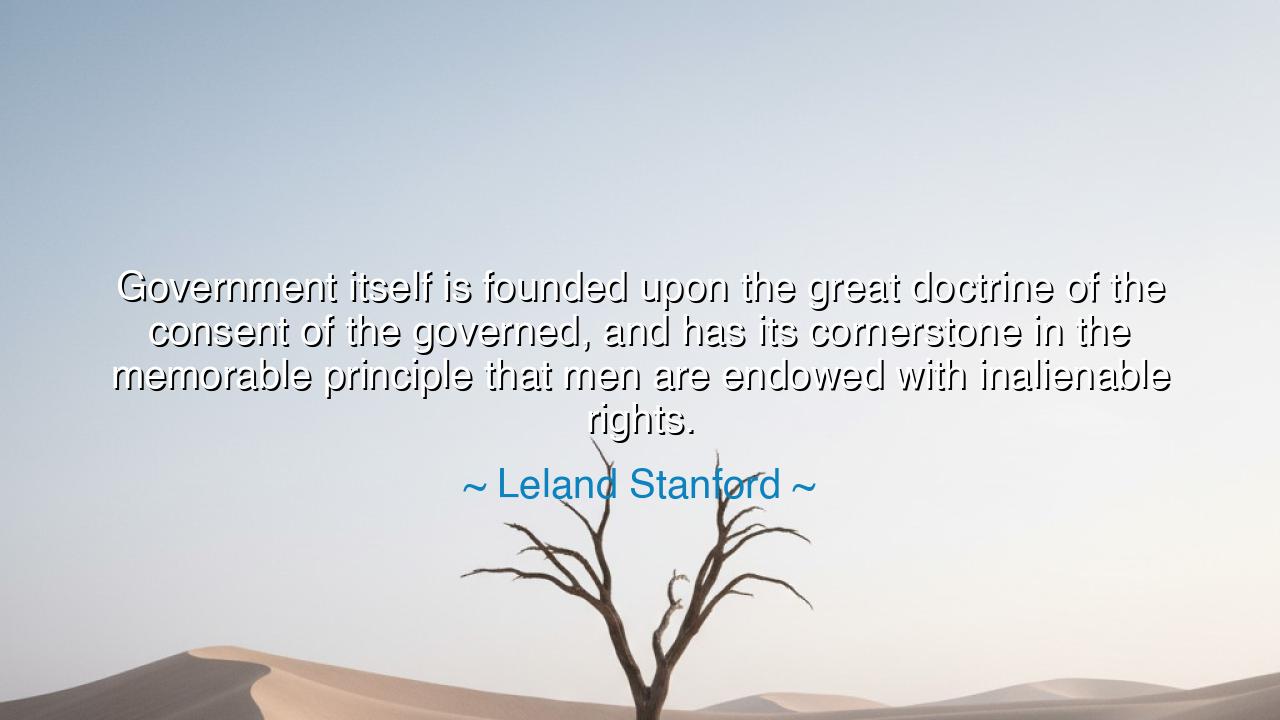
Government itself is founded upon the great doctrine of the
Government itself is founded upon the great doctrine of the consent of the governed, and has its cornerstone in the memorable principle that men are endowed with inalienable rights.






Hearken, children of liberty and seekers of wisdom, to the words of Leland Stanford, who proclaimed with enduring clarity: "Government itself is founded upon the great doctrine of the consent of the governed, and has its cornerstone in the memorable principle that men are endowed with inalienable rights." In this reflection lies a timeless truth about freedom, legitimacy, and the sacred obligations of rulers and citizens alike. Stanford reminds us that the authority of governance is not absolute, but granted by those it governs, and that the protection of rights is the very foundation of a just society.
The origin of Stanford’s insight rests in the principles of Enlightenment thought, which shaped modern democratic governance. Philosophers such as John Locke and Montesquieu articulated that legitimate government derives its power from the consent of the governed, and that individuals possess rights inherent and inviolable. Stanford echoes this wisdom, emphasizing that governance must honor the dignity, freedom, and autonomy of every person. Without this recognition, the structure of government collapses from the weight of tyranny or neglect.
Consider the imagery of the “cornerstone.” In architecture, the cornerstone is the first stone set, upon which the strength and alignment of the entire edifice depends. Likewise, the inalienable rights of men serve as the moral and legal foundation of government. Laws, policies, and institutions must be constructed upon this enduring principle; without it, the building of society is unstable, prone to injustice, and vulnerable to collapse. Stanford’s words remind us that freedom is not a decoration of governance—it is its very bedrock.
History provides vivid exemplars of this principle. In the American Revolution, the colonists resisted the overreach of a distant monarchy, invoking the doctrine of consent of the governed to assert their autonomy. The Declaration of Independence proclaimed that men are endowed with inalienable rights—life, liberty, and the pursuit of happiness—and that government derives its just powers from the will of the people. The revolutionary struggle exemplifies Stanford’s truth: legitimacy arises not from authority alone, but from the recognition and protection of fundamental rights.
Stanford’s insight is also a call to vigilance. A government that forgets its foundation—consent and rights—risks corruption, oppression, and rebellion. Citizens are not mere subjects; they are the source of authority, empowered to guide, restrain, and correct those in power. History teaches that societies flourish when rulers honor this covenant and falter when they disregard it. From the fall of Rome to modern struggles for civil liberties, the principle endures: consent and rights are inseparable pillars of just governance.
The lesson is eternal: freedom is the gift of recognition, and legitimacy is the result of respect for the governed. Governments must be accountable, transparent, and protective of rights; citizens must remain informed, engaged, and ready to assert their voice. Stanford reminds us that liberty is not merely inherited, but preserved through action, wisdom, and moral vigilance. The covenant between ruler and ruled is sacred, and its violation threatens the soul of society.
Practical actions emerge naturally: participate in civic life with awareness and responsibility; uphold and defend the inalienable rights of all individuals; demand transparency and accountability from those in power; educate oneself about the principles and structures that protect liberty; and ensure that governance always reflects the consent and dignity of the people it serves. By doing so, one strengthens the moral and institutional foundations that sustain a free and just society.
In sum, Stanford’s words illuminate a timeless truth: government exists not for its own sake, but as a steward of rights, empowered by the consent of the governed. Let this wisdom guide both citizens and leaders alike, so that authority is exercised with respect, justice is upheld, and liberty endures across generations. A society that honors this covenant builds not only structures and laws, but the enduring spirit of freedom itself.
If you wish, I can craft an even more epic, mythic version, turning Stanford’s reflection into a sweeping narrative about the heroic covenant between citizens and government—perfect for immersive audio storytelling. Do you want me to do that?






AAdministratorAdministrator
Welcome, honored guests. Please leave a comment, we will respond soon